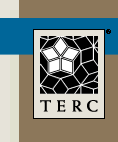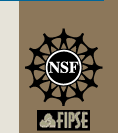 |
|
 |
|

|

Reopening the Science Door
Overview ... Rationale ... Project Goals ... Program Description ... Courses
Science in Education is a fully online master's degree program for K-8 educators developed in partnership by TERC and Lesley University. The project is funded by the National Science Foundation (NSF) and the U.S. Department of Education Fund for the Improvement of Postsecondary Education (FIPSE).
Rationale
A large proportion of teachers never experienced science inquiry in their own schooling. This is a major obstacle to improving science in schools. How can teachers guide students to fuller understanding of central science concepts if they do not understand the nature of science or have robust understand of the very concepts they teach?
Recent developments in distance learning present creative possibilities for addressing the need for sustained, high-quality professional development. It greatly increases the number of geographically dispersed learners who can participate. Learning occurs in teachers' homes or schools in asynchronous time. This allows teachers to better balance personal commitments with professional growth.
Project Goals
The Science in Education program is designed to help teachers extend their science knowledge and integrate inquiry-based science in their teaching, as well as to become familiar with web-based information technologies.
The primary aims are to provide a program that:
- is accessible and attractive to teachers;
- aligns with the National Science Standards;
- provides participants with the experience of inquiry learning and rich science content;
- supports participants as they integrate science processes, new curricular strategies and advanced technologies into their science teaching; and
- rewards professional development with appropriate recognition.
The program incorporates and thus models pedagogical practices that support learners in extending their understanding of core science concepts through inquiry.
Program Description
Science in Education is a fully online masterís degree program. It is designed for teachers, curriculum specialists, and instructional resource persons responsible for K-8 science education. The program aligns with National Science Education Standards, emphasizes inquiry-based science and introduces innovative, learner-centered teaching strategies.
Program Design: The 33-credit hour program is comprised of an introductory 3-credit hour course, Try Science, and five 6-credit hour modules. Each module focuses on a particular science domain. Course participants build science knowledge and pedagogical skills through a combination of on- and off-line learning and discussion with course colleagues. They engage in doing science to extend their understanding of concepts and skills, rethink teaching and assessment strategies, and implement ideas in their own classrooms.
Instruction: Each module is co-taught by two instructors. A scientist, well-versed in the science domain, guides participants in their acquisition of key science content, skills and values. A science educator supports participants as they learn and try out pedagogical strategies for bringing science inquiry to their classrooms.
Course Design: There are three main components to each online module --
- 50% of the module is devoted to learning science content by doing science;
- 25% of the module is devoted to considering issues of pedagogy, curriculum, and assessment; and
- 25% of the module is devoted to trying ideas in the classroom and reflecting on these experiences with other program participants.
For each course, participants begin their experience by doing science and becoming familiar with how inquiry-based science contributes to learning. As each course progresses, participant attention shifts to supporting science learning in the classroom. They commonly analyze classroom events presented through video, case studies, or samples of studentsí work to become familiar with new teaching and assessment strategies. Finally, they experiment with alternative strategies and curriculum in their professional lives, sharing successes and dilemmas with other program participants.
Program Courses
Try Science (3 credits)
- Science Content: Science as Inquiry and a human endeavor
- Pedagogical Focus: Developing conceptual understandings through
science inquiry
Investigating Physics (6 credits)
- Science Content: Exploring the organizing principles of forces
and motion
- Pedagogical Focus: Paying attention to learners' ideas about
scientific phenomena
Biology Explorations (6 credits)
- Science Content: An introduction to adaptation using an evolutionary
perspective
- Pedagogical Focus: The role of the teacher as a facilitator of
inquiry
Earth Science (6 credits)
- Science Content: Structures and changes in the Earth's system
- Pedagogical Focus: Curriculum and reform
Research Through Ecology (6 credits)
- Science Content: The interrelationships bewtween organisms and
their environment
- Pedagogical Focus: Assessment for Inquiry Science
From Science to Design (6 credits)
- Science Content: Meeting human need, solving human problems,
developing products
- Pedagogical Focus: Equity